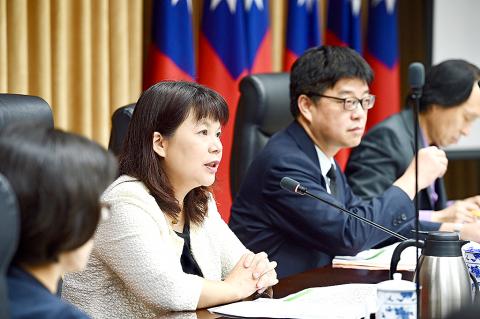Although there are not yet statistics about the impact of China’s 31 measures aimed at attracting Taiwanese professionals and businesses, they still pose a national security risk, the Mainland Affairs Council said in a report yesterday.
Using “equal treatment” and other offers, China’s measures are aimed at enticing Taiwanese to give up their right to “be their own masters,” the report said.
Taiwanese would lose their democracy, freedom and human rights, the report said, calling the 31 measures a “huge challenge” to Taiwan’s national security.

Photo: Peter Lo, Taipei Times
Taiwanese invested US$5.221 billion in China from January to July, a 2.77 percent decrease from the same period last year, the report said, citing statistics from the Ministry of Economic Affairs’ Investment Commission.
Directorate-General of Budget, Accounting and Statistics data showed that 407,000 Taiwanese worked in China in 2016, 13,000 less than in 2015, the report said.
Due to this year’s decline in Taiwanese investments in China, the number of Taiwanese working in China might also continue to decrease, it said.
Since the announcement of the 31 measures, no professors from Taiwan’s public universities or top private universities have taken up teaching positions in China, while the number of private-school teachers and university graduates who have gone to teach in China has been about the same as before, the report said, citing information from the Ministry of Education.
Of the 37,149 students who studied abroad last year, 2,567 — about 6.9 percent — studied in China, the report said.
From January to last month, 108 doctors who said they planned to practice medicine in China applied for a certificate of good standing from the Ministry of Health and Welfare, the report said.
That number was less than half that of last year’s or the 204 who applied in 2016, the report said.
While Beijing is making offers to Taiwanese willing to work in China, at the same time it is ramping up its suppression of Taiwan on the world stage, the report said.
Beijing uses credit score reporting systems and other methods to restrict freedom of speech and business operations, which pose risks for Taiwanese, the report said.
Taiwanese need to be aware of the risks associated with China’s offers, the council said.

US President Donald Trump said "it’s up to" Chinese President Xi Jinping (習近平) what China does on Taiwan, but that he would be "very unhappy" with a change in the "status quo," the New York Times said in an interview published yesterday. Xi "considers it to be a part of China, and that’s up to him what he’s going to be doing," Trump told the newspaper on Wednesday. "But I’ve expressed to him that I would be very unhappy if he did that, and I don’t think he’ll do that," he added. "I hope he doesn’t do that." Trump made the comments in

NOT AN OPENING: Trump’s violation of international law does not affect China’s consideration in attacking Taiwan; Beijing lacks capability, not precedent, an official said Taiwanese officials see the US’ capture of the president of Venezuela as a powerful deterrent to Beijing’s aggression and a timely reminder of the US’ ability to defeat militaries equipped with Chinese-made weapons. The strikes that toppled Venezuelan President Nicolas Maduro signaled to authoritarian leaders, including Chinese President Xi Jinping (習近平), US President Donald Trump’s willingness to use military might for international affairs core to US interests, one senior official in Taipei’s security circle said. That reassured Taiwan, the person said. Taipei has also dismissed the idea that Trump’s apparent violation of international law could embolden Beijing, said the official, who was not

A cold surge advisory was today issued for 18 cities and counties across Taiwan, with temperatures of below 10°C forecast during the day and into tonight, the Central Weather Administration (CWA) said. New Taipei City, Taipei, Taoyuan and Hsinchu, Miaoli and Yilan counties are expected to experience sustained temperatures of 10°C or lower, the CWA said. Temperatures are likely to temporarily drop below 10°C in most other areas, except Taitung, Pingtung, Penghu and Lienchiang (Matsu) counties, CWA data showed. The cold weather is being caused by a strong continental cold air mass, combined with radiative cooling, a process in which heat escapes from

Tourism in Kenting fell to a historic low for the second consecutive year last year, impacting hotels and other local businesses that rely on a steady stream of domestic tourists, the latest data showed. A total of 2.139 million tourists visited Kenting last year, down slightly from 2.14 million in 2024, the data showed. The number of tourists who visited the national park on the Hengchun Peninsula peaked in 2015 at 8.37 million people. That number has been below 2.2 million for two years, although there was a spike in October last year due to multiple long weekends. The occupancy rate for hotels